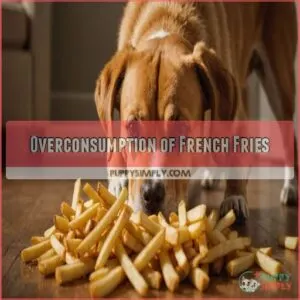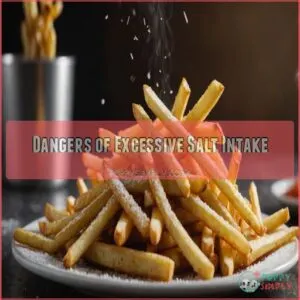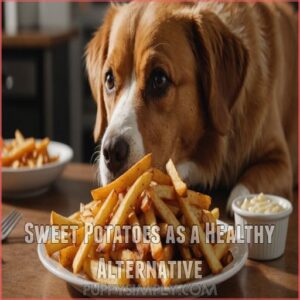This site is supported by our readers. We may earn a commission, at no cost to you, if you purchase through links.
 You might be tempted to share your French fries with your furry friend, but hold that thought!
You might be tempted to share your French fries with your furry friend, but hold that thought!
While dogs can technically eat French fries, it’s not a good idea.
These crispy treats are loaded with salt, fat, and often seasoned with ingredients that can upset your pup’s tummy.
Think of it like giving a toddler a triple espresso – it’s just asking for trouble!
The occasional fry that falls on the floor won’t hurt, but making it a habit can lead to obesity, digestive issues, and even salt poisoning.
Your dog’s puppy-dog eyes might be hard to resist, but trust us, there are much safer ways to show your love.
Stick around to discover some tail-wagging alternatives that’ll keep your pooch healthy and happy!
Table Of Contents
- Key Takeaways
- French Fries and Dog Health
- Why French Fries Are Bad for Dogs
- Signs and Symptoms of French Fry Consumption
- Safer Alternatives to French Fries for Dogs
- What to Do if Your Dog Eats French Fries
- Frequently Asked Questions (FAQs)
- Are french fries good for dogs?
- What is the nutrition and reason for eating french fries with skin left on?
- Can dogs eat Fries?
- Can dogs eat McDonald’s french fries?
- Can dogs eat French fry?
- Can a Dog Eat French fries from a drive-though?
- What happens if my dog eats a French fry?
- Can I give my dog a McDonald’s fry?
- Can dogs eat potatoes?
- Can my dog have a Chick-fil-A fry?
- Can dogs eat sweet potato fries instead?
- How many French fries are too many for dogs?
- Are air-fryer French fries safer for dogs?
- Can French fries cause long-term health issues in dogs?
- Are there any breeds more sensitive to French fries?
- Conclusion
Key Takeaways
- While dogs can technically eat French fries, you shouldn’t feed them to your pet due to their high salt and fat content, which can lead to obesity, digestive issues, and even salt poisoning.
- French fries offer no nutritional benefits for dogs and can cause serious health problems like pancreatitis, diabetes, and heart disease if consumed regularly.
- If your dog accidentally eats French fries, monitor them for signs of illness such as vomiting, diarrhea, excessive thirst, or lethargy, and provide plenty of water to combat dehydration.
- Instead of French fries, offer your dog healthier alternatives like plain baked or boiled potatoes, sweet potatoes, or specially made dog treats to keep them happy and healthy.
French Fries and Dog Health
While you might think sharing your crispy french fries with your dog is a harmless treat, these salty snacks can actually cause serious health problems for your furry friend.
Your dog’s body isn’t designed to handle the high levels of salt, fat, and seasonings found in french fries, which can lead to issues like obesity, pancreatitis, and even salt poisoning.
The Dangers of High Salt and Fat Content
While those puppy eyes might tempt you to share your fries, the high salt and fat content can wreak havoc on your dog’s health.
You’re looking at serious risks like salt poisoning and pancreatitis from just a few greasy bites.
These crispy treats can trigger digestive issues, leading to obesity and potential organ damage.
Think of it like a ticking time bomb for your furry friend’s wellbeing.
The Risks of Oils and Seasonings Used
Those crispy fries your pup’s eyeing aren’t just swimming in oils – they’re often loaded with seasonings that can spell trouble.
You wouldn’t believe what’s hiding in that golden-brown coating!
Here are three major concerns to watch for:
- Garlic and onion seasonings can trigger dangerous anemia
- Various oil types used for frying may cause inflammation
- Added spice blends often contain hidden toxins that harm your furry friend
Let’s keep those tails wagging with safer treats instead!
Effects on Digestive System and Overall Health
Feeding your pup those greasy fries can turn their tummy into a rollercoaster of troubles.
Beyond the oils and seasonings, you’re looking at serious gastrointestinal issues that’ll have your furry friend running to the yard more times than a squirrel spotting contest.
The high fat content can trigger pancreatitis, making your dog’s digestive system go haywire.
Trust me, no tail-wagging happiness is worth that stomach upset!
No Nutritional Benefits for Dogs
French fries might look tempting, but they’re a nutritional dead end for your furry friend. Beyond the upset tummy they cause, these crispy culprits offer zero nutritional value for your dog’s diet.
- French fries contain empty calories with no protein benefit
- Processed oils strip away any potential nutrients
- The cooking process destroys beneficial vitamins
You’re better off sticking to balanced, healthy dog treats that actually fuel your pup’s body and keep that tail wagging.
- Regular dog treats provide targeted nutrition your pup needs
- Natural alternatives offer both taste and health benefits
Obesity, Diabetes, and Heart Disease Risks
Let’s not sugarcoat it: French fries aren’t just empty calories for your pup. They’re a fast track to some serious health issues. Picture your dog as a furry little car – feeding them fries is like filling the tank with syrup. It might taste good, but it’s gonna gum up the works!
| Health Risk | Symptoms | Prevention |
|---|---|---|
| Obesity | Weight gain, lethargy | Healthy dog food, exercise |
| Diabetes | Excessive thirst, frequent urination | Low-carb diet, portion control |
| Heart Disease | Coughing, fatigue | Heart-healthy treats, regular check-ups |
| Joint Problems | Difficulty moving, limping | Weight management, fish oil supplements |
| Pancreatitis | Vomiting, abdominal pain | Avoid high-fat foods, stick to dog-safe snacks |
Remember, keeping your furry friend fit and healthy is way more fun than dealing with these French fry fallouts!
Why French Fries Are Bad for Dogs
You might think sharing your fries with your furry friend is a harmless treat, but it’s actually a recipe for disaster.
French fries are packed with salt, unhealthy fats, and potential toxins that can wreak havoc on your dog’s health, leading to everything from upset stomachs to serious long-term issues.
Overconsumption of French Fries
You might think tossing your pup a few fries is harmless, but it’s a slippery slope.
For those who want to learn more about dog-friendly alternatives, check out products related to Dog Eat Fries.
Overconsumption of french fries can lead to a doggy health disaster.
These crispy culprits can trigger pancreatitis, cause digestive upset, and pack on the pounds faster than you can say
Dangers of Excessive Salt Intake
Those golden, crispy fries aren’t just a calorie bomb – they’re a salt minefield for your furry friend.
While you might crave that salty kick, your dog’s body isn’t built to handle it.
Excessive salt can turn your pup’s tail-wagging day into a health nightmare faster than you can say "fetch!"
Here’s why salt’s no joke for your canine companion:
- Dehydration: Salt acts like a moisture magnet, leaving your dog parched
- Sodium poisoning: Too much salt can throw your dog’s electrolytes out of whack
- Vomiting and diarrhea: Salt overload can upset your pup’s tummy big time
- Seizures: In severe cases, salt toxicity can lead to scary neurological symptoms
- Kidney strain: Your dog’s kidneys work overtime to process all that extra sodium
Toxic Ingredients in French Fries
Salt isn’t the only villain in French fries.
The oils used for frying are a recipe for disaster, potentially causing pancreatitis in your furry friend.
And those tasty seasonings? They’re like a ticking time bomb.
Onion and garlic powder can lead to anemia, while other spices might upset your pup’s tummy.
It’s a real dog-eat-fry world out there, so keep those crispy treats to yourself!
Raw Potatoes and Solanine Risks
Ever wondered why raw potatoes are a no-go for your furry friend?
It’s all about solanine, a toxic compound lurking in uncooked spuds.
This sneaky substance can wreak havoc on your pup’s tummy, causing vomiting and diarrhea.
Cooking potatoes zaps most of the solanine, but raw potato skins are still danger zones.
To keep your pooch safe, stick to small portions of cooked potatoes without the skin.
Your dog’s tail will thank you!
Effects of French Fry Consumption on Joints and Organs
French fries aren’t just a raw deal for your dog’s tummy; they’re a full-body assault.
The unhealthy fats and excess salt in these crispy culprits can wreak havoc on your furry friend’s insides.
Here’s what you’re signing up for if you share your fries:
- Joint pain that’ll make your pup move like a rusty robot
- A heart working overtime, like it’s running a doggy marathon
- Organs throwing in the towel, waving the white flag of surrender
It’s not worth the tail wag, trust me.
Signs and Symptoms of French Fry Consumption
You’ll want to watch your pup closely if they’ve snacked on French fries, as they might show signs of trouble.
From upset tummies to excessive thirst, knowing what to look for can help you spot potential problems early and keep your furry friend safe.
Vomiting and Diarrhea in Dogs
Your furry friend’s stomach isn’t made for greasy treats.
If they’ve snuck some fries, watch out for the telltale signs of tummy trouble.
Vomiting and diarrhea are your dog’s way of saying, "Houston, we’ve a problem."
These symptoms can lead to dehydration, so keep an eye on your pup.
| Symptom | Cause | Action |
|---|---|---|
| Vomiting | Grease overload | Monitor closely |
| Diarrhea | Fat intolerance | Offer water |
| Lethargy | Stomach upset | Call vet if persistent |
Don’t panic, but don’t ignore these signs either.
Your quick action can prevent a French fry fiasco from becoming a bigger health risk.
Excessive Thirst and Dehydration
Thirst-quenching frenzy! If your pup’s slurping water like there’s no tomorrow after munching on fries, it’s a red flag.
The salt overload can trigger excessive thirst and dehydration, throwing their electrolyte balance out of whack.
Watch for dry gums, sunken eyes, or loss of skin elasticity. These signs scream "doggy dehydration!"
Don’t let salt toxicity wreak havoc on your furry friend’s kidney health. Keep the water flowing and the fries at bay!
Lethargy, Shaking, and Seizures
Excessive salt intake can pack a punch beyond just making your pup thirsty.
Consuming high-salt foods like fries and their risks can lead to severe complications, including pancreatitis and obesity.
Keep an eye out for the tell-tale signs of salt poisoning: lethargy, shaking, and seizures.
If your furry friend’s acting like they’ve been hit by a
Recognizing The Signs of Salt Poisoning
Salt poisoning in dogs can sneak up on you like a sneaky French fry thief!
Keep an eye out for these telltale signs: extreme thirst, frequent urination, and swollen tongue or gums.
Your pup might also seem confused, wobbly on their feet, or even have seizures.
If you spot these symptoms after a fry feast, don’t wait – call your vet pronto!
Quick action can be a real lifesaver for your furry friend.
Watching for Digestive Issues and Pancreatitis
Beyond salt poisoning, your pup’s French fry feast might lead to a digestive rollercoaster.
Keep an eye out for tummy troubles like vomiting or diarrhea – they’re your dog’s way of saying, "Houston, we’ve a problem!"
These symptoms could signal pancreatitis, a serious inflammation that’ll have your furry friend feeling under the weather.
If you notice your dog’s acting like they’ve got a food hangover, it’s time to ring the vet.
Safer Alternatives to French Fries for Dogs
You don’t have to deprive your furry friend of tasty treats just because French fries are off-limits.
From baked sweet potatoes to homemade meat snacks, there’s a world of safe, tail-wagging alternatives that’ll keep your pup happy and healthy.
Baked, Boiled, or Mashed Potatoes
Now, let’s talk about safer spud options for your furry friend.
While French fries are a no-go, plain baked, boiled, or mashed potatoes can be a treat in moderation.
You can also check out dog potato treats for some healthier options.
Skip the butter, salt, and seasonings – your pup doesn’t need the extra jazz.
Think of it as potato au naturel!
Remember, moderation is key. Too much of a good thing can still lead to an upset tummy or weight gain. Stick to small portions as an occasional treat.
Sweet Potatoes as a Healthy Alternative
Looking for a tasty alternative to French fries for your furry friend?
Sweet potatoes are the way to go!
These orange powerhouses pack a nutritional punch for your pup.
Bake them up into sweet potato fries or mash them for a delicious dog-friendly treat.
They’re lower in calories than white potatoes and loaded with fiber, vitamins, and minerals.
Your dog’s tail will be wagging for these healthier "fries"!
Avoiding Raw Potatoes and Toxic Ingredients
While sweet potatoes are a paw-some alternative, watch out for raw potatoes and toxic ingredients.
Raw spuds are no bueno for your furry friend, packing a punch of solanine that can turn your pup’s tummy into a doggy disaster zone.
Here’s the lowdown on keeping your pooch safe:
- Ditch the raw potatoes and pesky peels
- Say "no" to onion and garlic seasonings
- Cook potatoes thoroughly to zap that solanine
Remember, a safe snack keeps your tail-wagger’s tail wagging!
Meat-Based Treats and Dehydrated Fruits
Your pup deserves better.
Treat them to tasty meat-based snacks or dehydrated fruits instead.
These natural goodies pack a nutritional punch without the risks of junk food.
Look for brands using high-quality proteins and fruits without added sugars or preservatives.
Dehydrated fruits offer a sweet crunch while providing vitamins and fiber.
Mix it up with different flavors to keep your furry friend’s tail wagging.
Remember, moderation is key – even with healthy treats!
Preparing Homemade Dog Treats
You’ve got the power to whip up tail-wagging treats right in your kitchen.
Making homemade dog treats can be a fun and rewarding bonding activity, allowing you to control the ingredients and save money compared to store-bought options.
Check out simple recipes like those for healthy dog treats made easy.
Ditch those risky fries and try these homemade goodies instead.
Your pup will love ’em,
What to Do if Your Dog Eats French Fries
If your furry friend snags a few fries, don’t panic.
Keep a close eye on them for any signs of illness.
Offer plenty of water.
Be ready to call the vet if needed.
Providing Plenty of Water for Dehydration
Your pup’s French fry feast calls for a water intervention!
Salty snacks can leave dogs parched, so keep that water bowl full.
Encourage frequent sips to combat dehydration and flush out excess salt.
Think of it as nature’s detox – helping your furry friend dodge the dreaded salt poisoning.
Remember, hydration is key to keeping your dog’s tail wagging after an unexpected fry fiasco.
Monitoring Your Dog for Signs of Illness
After your furry friend snags some fries, keep a watchful eye out for trouble.
Look for signs of an upset tummy, like vomiting or diarrhea.
Notice if your pup’s energy levels drop or they’re not interested in their usual treats.
Excessive thirst could signal salt toxicity.
If these symptoms pop up, it’s time to take action.
Remember, catching issues early can help prevent more serious problems like pancreatitis.
Seeking Veterinary Advice
Uncertainty about your dog’s health after a French fry feast can be nerve-wracking.
Don’t hesitate to call your vet if you’re worried.
Many online vet services, such as those available through Online Vet Consultation, offer quick, affordable consultations for pet health concerns.
They’ll guide you on dog food safety and potential issues like pancreatitis or stomach problems.
Remember, it’s
Preventing Access to French Fries
Let’s face it, those puppy eyes can make anyone weak in the knees.
But regarding french fries, you’ve got to be the top dog.
Here’s how to prevent your furry friend from snagging those salty snacks:
- Dog-proof your kitchen by storing fries out of reach
- Train your pup with "leave it" commands for human food
- Establish clear rules about no table scraps
- Keep pet-friendly snacks handy as tasty alternatives
Remember, a little prevention goes a long way in keeping your pooch healthy and happy!
Keeping Dogs Away From Human Food
Your pup snagged some fries? Don’t panic.
First, offer plenty of water to combat dehydration from the salt.
Keep an eye out for any tummy troubles or unusual behavior.
If your dog scarfed down a bunch or shows signs of illness, give your vet a ring.
To prevent future fry fiascos, stash human food out of reach and stock up on dog-safe snacks.
Your furry friend will thank you with tail wags and a healthy tummy!
Frequently Asked Questions (FAQs)
Are french fries good for dogs?
Every dog has its day, but it shouldn’t include French fries.
They’re a no-go for your furry friend.
High in salt and fat, these treats can lead to obesity, digestive issues, and even pancreatitis.
Stick to dog-friendly snacks instead.
What is the nutrition and reason for eating french fries with skin left on?
Potato skins pack fiber, vitamins B and C, and minerals like iron and potassium.
You’ll get more nutrients when you leave the skin on, though you’ll want to scrub them thoroughly before cooking.
Can dogs eat Fries?
Like a ticking time bomb for your furry friend, french fries pack harmful fats and salt that can wreck their health.
You’ll want to skip sharing these crispy treats to keep your pup safe and healthy.
Can dogs eat McDonald’s french fries?
You shouldn’t feed your dog McDonald’s french fries.
They’re loaded with salt, unhealthy fats, and seasonings that can cause digestive issues, pancreatitis, and obesity.
Stick to dog-approved treats for your furry friend.
Can dogs eat French fry?
Studies show 60% of dogs experience digestive issues from French fries.
Don’t share those crispy temptations – the high salt and fat content can lead to pancreatitis.
Stick to dog-friendly treats instead.
Can a Dog Eat French fries from a drive-though?
Drive-through French fries aren’t safe for your furry friend.
The high salt, fat, and seasonings can cause digestive issues and lead to pancreatitis.
Keep your pup healthy by offering dog-approved treats instead.
What happens if my dog eats a French fry?
One french fry probably won’t harm your pup, but it’s still risky.
High salt and fat content can trigger stomach upset,
while regular snacking leads to serious health issues like pancreatitis and obesity.
Can I give my dog a McDonald’s fry?
You shouldn’t give your dog McDonald’s fries.
The high salt, fat, and seasoning content can cause stomach upset, dehydration, and even pancreatitis.
Save your pup’s health by offering dog-friendly treats instead.
Can dogs eat potatoes?
Cooked potatoes can be safe for your furry friend when served plain, without seasonings or oils.
Raw potatoes contain toxic solanine, so you must fully cook them and skip the peels entirely.
Can my dog have a Chick-fil-A fry?
Those tempting Chick-fil-A fries aren’t safe for your furry friend.
The high salt and fat content can cause digestive issues and potentially lead to pancreatitis.
Skip sharing and stick to dog-approved treats instead.
Can dogs eat sweet potato fries instead?
While sweet potato fries might seem like a healthier option, they’re still not ideal for your furry friend.
Baked, plain sweet potatoes are a better choice.
Skip the oil and seasoning, and offer small amounts as an occasional treat.
How many French fries are too many for dogs?
Even one French fry is too many for your furry friend.
They’re a no-go zone for dogs, packed with unhealthy fats and salt.
Stick to dog-friendly treats instead – your pup’s tail will still wag with joy!
Are air-fryer French fries safer for dogs?
Just as you’re reaching for those crispy air-fryer fries, your pup gives you puppy eyes.
But hold up! Air-fryer fries aren’t safer for dogs.
They’re still high in fat and salt, which can upset your furry friend’s tummy.
Stick to dog-friendly treats instead.
Can French fries cause long-term health issues in dogs?
French fries can indeed cause long-term health issues in dogs.
They’re like a ticking time bomb for your furry friend’s well-being.
Regular consumption may lead to obesity, heart problems, and diabetes.
It’s best to keep those crispy temptations off your pup’s menu.
Are there any breeds more sensitive to French fries?
While all dogs should avoid French fries, smaller breeds like Chihuahuas and toy poodles are more sensitive.
Their tiny bodies can’t handle the high fat and salt content as well as larger breeds.
Keep those fries to yourself!
Conclusion
Just like a dog chasing its tail, the temptation to share French fries with your pup can lead you in circles.
While the occasional fry won’t be catastrophic, it’s best to keep these salty snacks off your dog’s menu.
Remember, can dogs eat French fries? Technically yes, but they shouldn’t.
Instead, opt for healthier alternatives that’ll keep your furry friend’s tail wagging.
By making informed choices about your dog’s diet, you’re not just feeding them – you’re investing in a lifetime of health and happiness.



















